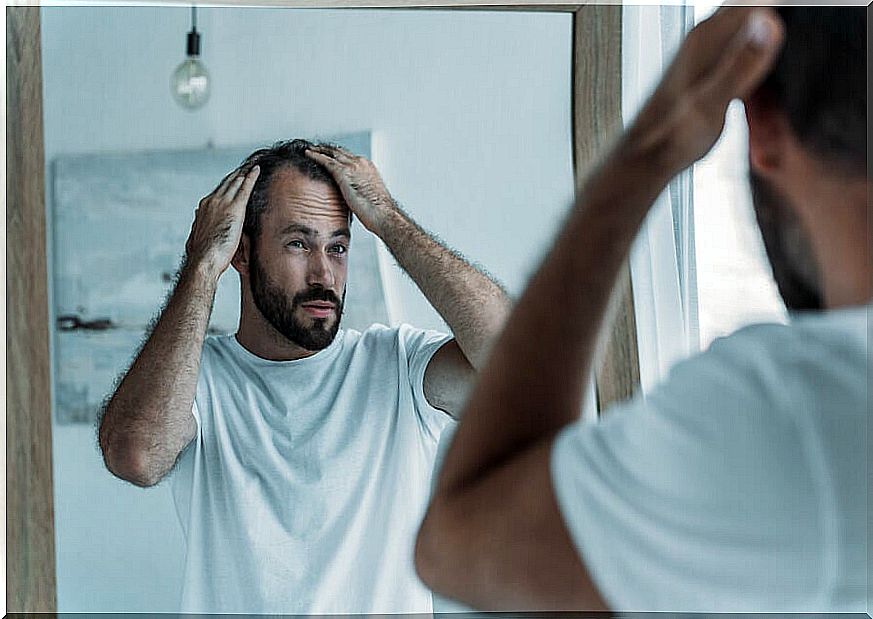For What Reason May You Be Losing Your Hair? Here We Tell You!
If you notice lately that you are losing your hair, this can be due to different causes such as hereditary baldness, hormones, thyroid problems and other diseases.
This condition can appear suddenly or gradually, affecting only the scalp or the entire body. Some types of hair loss are temporary while others are permanent.
To learn more about it, we consulted information from the American Academy of Dermatology and found several factors that influence this problem. Here are the most common ones so you can try to identify them.
Hereditary baldness
Hereditary baldness, also known as androgenetic alopecia, is characterized by progressive hair loss that can begin at any time after puberty, although it usually occurs much later.
As detailed in a study published in American Family Physician , this form of hair loss is prevalent in men, although women may also suffer from it, and many of the cases have a family history of this condition.
Currently, there are topical creams and oral medications that could help prevent, slow, or significantly reduce hair loss. These treatments should be used indefinitely since, as the study suggests, stopping them makes the problem appear again.
Alopecia areata

Alopecia areata is an autoimmune disease that attacks the body’s hair follicles, responsible for holding hair in place. Their presence could explain why you are losing your hair.
People with this condition can suffer hair loss anywhere on the body, including the scalp, nose, and ears. Some people even lose their eyelashes or eyebrows.
Pregnancy
The hormonal disorder that occurs in pregnancy can trigger many conditions, including hair loss, which can occur early, but is more common in the weeks after delivery.
A study published in Biomed Research International suggests that during pregnancy there is an increase in the amount of hair. However, after delivery, hair cycles return to normal and hair that was not lost during pregnancy is removed.
Female hormones
Just as pregnancy hormones cause hair loss, birth control pills can also have this effect. If you don’t use pills but are in menopause, you could still have this problem.
This is because the activity of hormones weaken the hair follicle, facilitating its fall. If the problem is the contraceptive pills it is important that you look for alternatives with your gynecologist. On the other hand, if it is about problems related to menopause, the doctor is the one to give you the necessary recommendations.
Medicines
Being under treatment with some medications could be the reason why you are losing hair. This can occur due to the alteration in the hair growth cycle.
Although the symptoms may disappear when the medication is stopped, it is important that you do not stop before talking to your doctor. Stopping them without professional authorization could cause health problems.
According to a study published in The National Center for Biotechnology Information , although the diagnosis of drug-induced alopecia remains difficult, among the medications that can have this side effect are the following:
- Anticoagulants and antithyroids
- Anticonceptive pill
- Cimetidine
- Retinoids
- Amphetamines
- Bromocriptine
- Levodopa
Thyroid

A person has hypothyroidism when their thyroid gland is not working properly. This organ is located in the neck and is responsible for producing hormones necessary for metabolism, growth and other vital functions.
If the thyroid does not work properly, there can be a wide variety of imbalances; one of them is hair loss. Only the doctor can indicate the most appropriate treatment so that the thyroid returns to its normal levels.
Emotional stress
If you are going through an emotionally complicated situation, this can cause or accelerate hair loss.
A publication in The American Journal of Pathology suggests that stress could produce significant changes in the proper functioning of the hair follicles, causing them to not promote hair development correctly.
- To combat stress, you can find calming activities like walking, yoga, or exercise.
What else can we do if we are losing hair?
The first thing is to talk to your doctor about the possible causes of why you are losing your hair. Then, as the case may be, study the therapeutic options. Some treatments that he might recommend include medications such as Minoxidil – which is available over the counter -, hair transplant surgery, and laser therapy.









